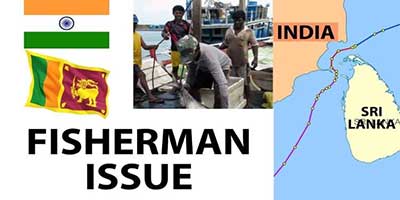Relevance: GS-2: India and its neighbourhood relations
Relevance: GS-3: Conservation, environmental pollution and degradation, environmental impact assessment
Key Phrases: Sri-Lankan civil war, Palk Strait, International Maritime Boundary Line (IMBL), Bottom trawling, Deep sea fishing methods
Why in News ?
- The Sri Lankan Navy on Saturday arrested 12 Indian fishermen from Rameswaram district, Tamil Nadu, and seized two of their fishing boats on charges of engaging in illegal fishing activity.
- This is the third such arrest in a fortnight, prompting Tamil Nadu Chief Minister M.K. Stalin to, yet again, write to Prime Minister Narendra Modi, seeking the Centre’s immediate intervention to secure their release.
- The development comes about 10 days after fishermen in Jaffna, in Sri Lanka’s Northern Province, held a large protest, demanding strict implementation of Sri Lankan laws against illegal fishing by Indian vessels.
Background
- For well over a decade now, since the end of Sri-Lankan civil war, fishermen of India and Sri Lanka have been unable to agree on how to share the fishes in the narrow Palk Strait separating the two countries.
- The Strait begins just north of Sri Lanka’s Jaffna peninsula and spans about 100 km at its widest point. It is known to be a breeding ground for rich marine resources, especially shrimp.
- Although India and Sri Lanka agreed to divide the Strait with an imaginary boundary line in the 1970s - the International Maritime Boundary Line (IMBL) - Indian fishermen are frequently arrested by the Sri Lankan Navy for “poaching” or engaging in “illegal” fishing activity in Sri Lankan waters.

- Several rounds of bilateral negotiations between the two governments and talks between fishing community leaders from both sides have been held over the years, but no solution has been found yet.
- Though a long-dragging fishing issue dominating Indo-Lanka bilateral ties, the recent weeks saw an escalation in tensions between fishermen following the death of two Jaffna fishermen, reportedly in mid-sea clashes with their Tamil Nadu counterparts.
- Sri Lanka has termed the fisheries conflict a diplomatic “flashpoint”, threatening ties that are on the mend after a period of strain.
What are the main contentions between India and Sri-Lanka on fisheries issues?
- Tamil vs Tamil: The primary conflict here is between the Tamil Nadu trawler owners and the northern Sri Lankan tamil fishermen, who are trying to rebuild their livelihoods after Sri Lanka’s civil war ended in 2009.
- Unsustainable Trawling: The main contention between the fishermen on either side is about the use of “bottom trawling”, the fishing method used by fishermen from Tamil Nadu.
- Marine resources degradation: In this method, fishermen set out on mechanized boats and drag large fishing nets through the seabed. While they primarily target fish species and shrimps, the practice also scoops out eggs, young fishes, and other marine organisms damaging the seabed.
- Sri-lankan revival after civil war: It is in the post-war decade that the Sri Lankan fishermen started voicing concern about depleting catches, owing to incessant trawling by the Indian fishermen.
- IMBL breach by Indian Fishermen: With the Indian side of the IMBL already ravaged by decades of high profit-yielding bottom trawling, they flock to the Sri Lankan side, with relatively less damage and therefore, more marine resources.
- A glaring asymmetry in power and resources fuelling disputes:
- The clash now is essentially over competing livelihoods of two Tamil-speaking fisher communities, with a glaring asymmetry in power and resources.
- The Tamil Nadu fishing community, especially the trawler owners, are not only wealthier but also very politically influential.
- The northern Sri Lankan fishermen, on the other hand, are coming out of a brutal war, braving enormous losses and destruction. They use modest boats to practice traditional fishing and get little state support to resurrect their livelihoods.
Why are fisherman issues yet to be resolved?
- Firstly, the growing human cost of the conflict:
- Five Indian fishermen returned home dead last year after the Sri Lankan Navy allegedly attacked them mid-sea.
- More recently, the death of the two Jaffna fishermen has aggravated the anger on the Sri Lankan side as well.
- For years now, India has urged Sri Lanka to adopt a humanitarian approach when it deters Indian fishermen.
- However, when fishermen deaths occur, apart from customary condemnations and denials, there is little effort from authorities on either side to ensure investigations are completed and perpetrators brought to book.
- Secondly, Indian government failure to incentives the fishing
community to adopt more sustainable fishing practices
- New Delhi tried diverting Tamil Nadu fishermen to 'deep sea fishing methods' to wean them away from bottom trawling in the Palk Strait.
- But the initiative did not take off as planned , and the fishermen still resort to trawling, and often get caught by Sri Lankan authorities.
- Thirdly, Tamil Nadu is yet to agree to the chief demand of northern Tamil fishermen :- To stop bottom trawling to restore trust between the fishermen on both sides, and provide a real opportunity to re-commence talks, which they prefer over confrontation.
Conclusion
- The northern Tamil fishermen repeatedly acknowledge Tamil Nadu’s solidarity and support extended to Sri Lankan Tamils during the years of war and later.
- But they also remind their brothers across the Palk Strait that solidarity does not justify exploitation of resources on which their lives and livelihoods depend.
Source: The Hindu
Mains Question :
Q. Rooted in historical solidarity, India’s engagement with Sri-Lanka has been critical for its Indo-Pacific foreign policy matrix. Discuss strategic significance of Sri-Lanka for India and suggest some measures to improve straining relations between India and Sri-Lanka. 15 marks)









